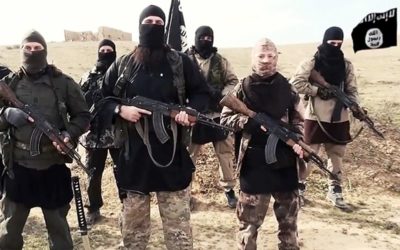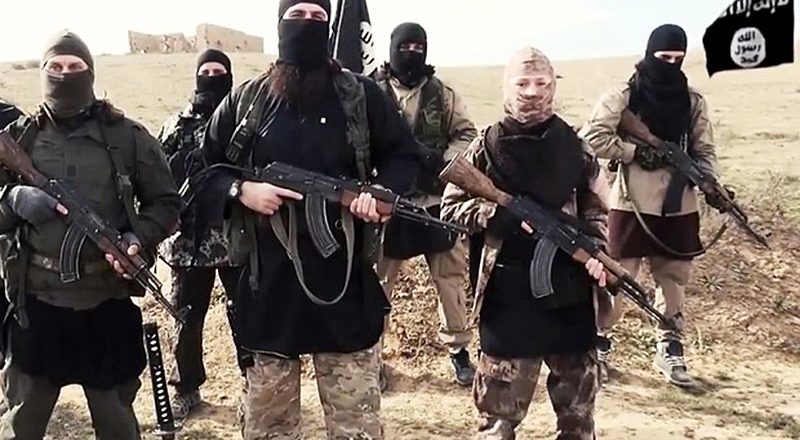A nation must think before it acts.

Each week during the summer, FPRI holds a seminar exclusively for its interns. On July 21, Dr. Barak Mendelsohn, Senior Fellow at FPRI and Associate Professor of Political Science at Haverford College, delivered the sixth talk on al-Qaeda, ISIS, and their threat to the U.S. and allies.
Since 9/11, scholars and citizens across the United States have heralded jihadi terrorist groups as the single greatest threat to American national security. Mendelsohn however, argued that this assessment is not only hyperbolic, but it also fundamentally mischaracterizes the current objectives of al-Qaeda and ISIS. While both groups continue to make use of fiery rhetoric against the American far enemy, Mendelsohn posited that their actions demonstrate a prioritization of near enemy regimes in the Islamic world. With this realignment, both al-Qaeda and ISIS have increasingly shifted their tactics away from terrorism in favor of insurgency. It is for this reason that Mendelsohn argued we should rethink using the oft vague terminological framework of terrorism. While some scholars argue that any group that commits acts of terror are inherently terrorists, Mendelsohn argues that this label is too often used to describe insurgent groups that occasionally make use of terrorism. In order to properly counter al-Qaeda and ISIS, Mendelsohn suggested using the term “armed non-state actor” for both groups. This shift in terminology is critically important for policymakers because unlike terrorism—which serves as a political buzzword that must be met with extreme and often disproportionate measures—the term armed non-state actors allows for a more rational threat assessment that accounts for the multidimensional nature of these groups.
Mendelsohn assessed the strengths and weakness of the labels terrorist and insurgent. For example, states can often unite behind combating a terrorist organization in ways that they would not for an insurgency. Additionally, the negative connotations of the terrorism label can help delegitimize armed non-state actors. These strengths are overshadowed by the negative consequences inherent in applying an arbitrary term like terrorism. This can allow other states to justify the oppression of legitimate political opposition by referring to them as terrorists. Russia, for example, has been able to have legitimate Chechen political opposition organizations placed on the UN Sanctions List by labelling them terrorists. The term insurgency, by contrast, recognizes groups as political actors and does not ignore the fact that these groups can utilize terrorism to advance their political agendas. This label, however, can legitimize groups that are anything but legitimate. Ultimately, armed non-state actors serves as a hybrid label that can include the benefits of both terrorist and insurgent labels without incorporating their weaknesses.
In terms of the threat posed by ISIS and al-Qaeda at this time, Mendelsohn offered a nuanced perspective. ISIS, while in serious decline, still has the potential to carry out major attacks in the Middle East and Europe. That being said, the group is unlikely to regain the stature it had before its decline started in 2015.
Mendelsohn argued that ISIS could mount a comeback, however, as there is a market for its utopian ideas regarding the establishment of an Islamic caliphate. While ISIS has the potential to survive in other peripheral areas of the Middle East, Iraq’s Sunni provinces still represent the most hospitable area for the jihadi group. As long as Iraq’s Shia-dominated government marginalizes Sunnis—especially if it fails to commit the billions of dollars needed to rebuild the many Sunni-dominated urban areas destroyed in the campaign against the Islamic State—many will continue to see ISIS as a better political option than the Iraqi government. As long as ISIS maintains even a semblance of legitimacy in the eyes of Islamic radicals, it will continue to attract zealots from around the world and disenfranchised Sunnis in areas like Iraq.
Though Mendelsohn painted a clear picture of ISIS’s decline, he asserted that the picture is far more complicated in the case of al-Qaeda. While al-Qaeda lost two of its largest and most capable franchises in recent years—the Islamic State of Iraq (now ISIS) and Jabhat al-Nusra (now HTS)—it has been able to keep control of its other affiliates. Al-Qaeda’s main difficulty lies in the incoherence of its current objectives and message. Although the group has maintained its anti-American and anti-Western rhetoric—even moving its elite Khorasan Group into Northeastern Syria to be closer to Europe—it has issued explicit commands ordering its affiliates not to launch attacks against the West. Even if al-Qaeda were to order its affiliates to attack targets in the West, there is scant evidence to indicate that they would actually do so. Rather, al-Qaeda’s franchising has actually entrenched the organization more in the Middle East. Eventually, al-Qaeda Central’s relevance will decline to the point where it will only serve in an advisory capacity to largely independent and locally focused affiliates.
While Mendelsohn’s talk emphasized al-Qaeda and ISIS, he made a point of addressing the rise of the larger jihadi movement. In the years after 9/11, America committed innumerable resources to fighting jihadis, yet the movement has only expanded. This expansion is not reliant on the successes of larger armed non-state actors like ISIS and al-Qaeda, but rather the proliferation of smaller, locally focused groups. Does a bigger jihadi movement constitute a more expansive threat to America? Mendelsohn argued emphatically that it does not. While a jihadi movement that aggregated the numerous armed non-state actors would be a substantive threat to America, the threat posed to America by the contemporary jihadi movement is overblown and relatively insignificant in comparison with other, more conventional state adversaries.
Mendelsohn illustrated five approaches that America could take to counter the current jihadi movement: normative change, prevention through suppression, foreign intervention, foreign intervention and nation-building, and containment. Of these five policies, Mendelsohn prescribed the last as the most pragmatic and effective for the United States moving forward. Mendelsohn dismissed normative changes, which would entail convincing everyone in the world that killing innocents is wrong, as unrealistic and ambiguous as there would surely be disputes over who qualifies as innocent. Secondly, prevention through suppression is a method that has the potential to prevent attacks, but at inordinate costs to civil liberties and other foundational democratic rights. The third and fourth possible initiatives (foreign intervention and foreign intervention and nation-building) best represent the policies implemented by the American government in Iraq and Afghanistan. These wars proved not only ineffective, but also fiscally disastrous, imbuing the American public with a reticence for nation-building that has not yet faded. Containment, by contrast, presents a cost-effective strategy that could be amenable to the American public.
This strategy acknowledges that terrorism can not be wholly eradicated, but it can be contained. According to Mendelsohn, just as terminology should evolve to reflect the actual threat presented by the contemporary jihadi movement, so too should American strategy to counter these groups. On the homefront, the goal should not be to eliminate terrorism—a goal which is simply impossible—but rather to reduce the number and lethality of attacks. Instead of exaggerating the threat presented by terrorist attacks, which can often be quite counterproductive, we must learn to live with the threat and put it in perspective. While every attack is a tragedy, their strategic importance is usually low. When they do have a strategic impact, it is typically as a result of overblown media coverage and irresponsible political brinkmanship.
In addition to pursuing conventional counterterrorism measures such as stopping plots before they occur, killing/arresting jihadi leaders who pose a tangible threat to American national security and addressing the underlying causes of radicalization, Mendelsohn argued that special attention must be paid to ensuring that jihadi armed non-state actors do not acquire WMDs. Mendelsohn’s containment approach offers American policymakers a way to confront jihadi armed non-state actors that is cost-effective, ethically acceptable and proportionate to the threat these groups pose to the United States.




